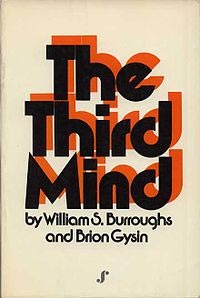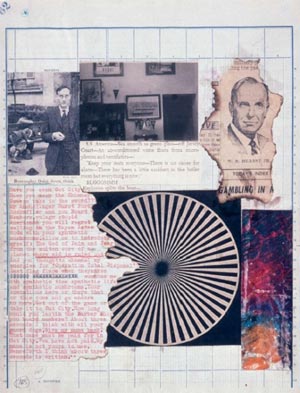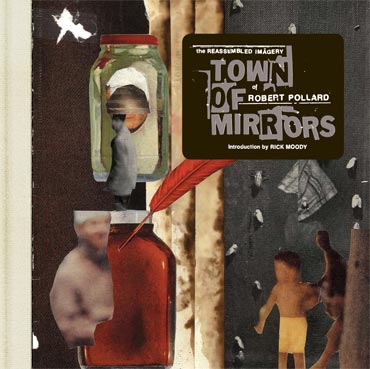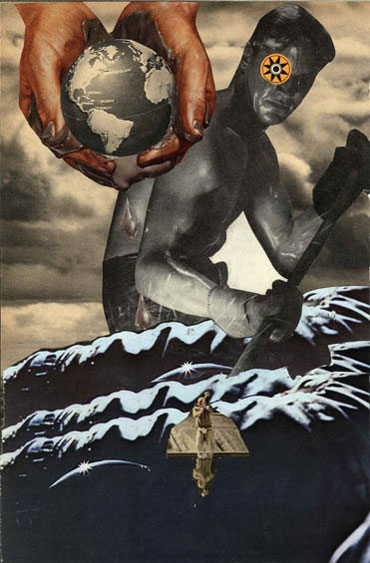The story of how I got into Pollard’s (now reunited) Guided By Voices is a strange one, and as with everything regarding my youth, drenched in debauched sonic witchery. When GBV’s absolute classic Bee Thousand finally brought national attention to the then almost entirely unknown band in the mid ’90s (mainly due to the efforts of Matador Records), I bought a copy. Truthfully, I didn’t like it that much after a few listens. I even most bizarrely remember driving around with my dad at one point and him mentioning that he heard a segment about them and their supposed “indie rock” on NPR and was curious. I put it on. Neither one of us got it.
And that’s sort of the thing you have to point out to GBV detractors. Even though I have nearly 40 Pollard-related releases at this point, I still don’t like any of them until run through number four at least. None of it makes sense at all when it first hits me. I have absolutely no idea how he does this, but it’s the sort of thing that’s going to confuse the shit out of critics, myself included, especially in the information age.
Robert Pollard’s Discography
Because of my increased presence in her proximity over the next year, I also increasingly delved into the wonder that is Dayton’s finest. Living in Columbus at the time, I started to see the shadow of psychogeography Pollard cast on the entire region’s sonic infrastructure as I got into albums like Alien Lanes and Speak Kindly of Your Volunteer Fire Department. Despite this, I didn’t truly understand the magnitude of GBV’s cult like appeal until I went to a pre-funk party before one of their shows with her. What the hell is going on here? Some of these people were following this band from town to town on tour and looked at Uncle Bob like he was god. I still wasn’t feeling it on that level at all. Not even close.
But of course, that girl eventually broke my heart and handed it to me, so you’d think this would lead to me hating the band for emotionally retarded reasons. It did. I didn’t even bother buying a copy of Isolation Drills when it hit despite the amazing reviews, and I tried to convince myself they weren’t incredible, which I sort of knew they were. In fact, when I moved to Seattle I noticed the library had like 8 of his various albums and I put them all on hold and burned them (remember that?). Every now and then, I found time to listen, and each time, it was the same thing. “I don’t get this one” – and then on listen five, I’d have every track stuck in my head. After a while, I started to get a bit weirded out. Wait a minute, how many good albums has this dude put out? The local record store had another fifteen I’d never heard of. I started picking those up at a rate of, I don’t know, a couple a year for a decade thereafter. Again, pretty much all good in their own way. I was starting to get it. The man was possessed with a singular vision, to write more songs than anyone in history, and he was unfuckwithable on that front. From there the compulsory GBV nerd-dom in me was sort of inevitable.
And you know, it’s inner configurations like this that truly make you contemplate the subjective nature of reality and how that’s molded exactly. Is Robert Pollard the greatest living songwriter in existence, or is there something about a young woman writhing on top of you while singing the lyrics to Echoes Myron that transforms your micro-consciousness forever? Interesting questions which compound themselves when you take into account a vision I had years later. In it, I found myself in a sleep paralysis state with a spectral entity lasciviously latched onto my side. I asked it what I should write my next song about and it jokingly told me: “write it about Freud.” Years later, I wrote a GBV rip-off tune on accident, based on a bandmate’s bass riff idea. It got named one of the top indie rock tracks of the 2012 on the Rex Manning Day website. The fact that a former angry metal dude like me would write a “top indie track” according to anyone still sort of amuses me, but that’s beside the point.
What’s important is the bizarro alternate reality that Mr. Pollard has created with his creative vision quest. As I later found out, the guy’s also a fairly accomplished collage artist who does most of his project’s album covers and who also put out an amazing art book called Town of Mirrors: The Reassembled Imagery of Robert Pollard, which I highly recommend. In fact, I didn’t realize until just recently that he’s also self-released nine paperback volumes of his Eat collage compilations. It was while watching basketball that I perused some of these one Sunday afternoon, that it suddenly occurred to me: wait, this guy’s sort of tapping into the whole William S. Burroughs/Brion Gysin concept of creatively accessing what they referred to as The Third Mind!
The Third Mind

The Third Mind is a collaborative book created by artist/poet/novelist Brion Gysin, who is first credited with discovering the “cut-up technique”, and novelist William S. Burroughs, who later popularized the technique’s use. The book contains short fiction by Gysin, an interview with Burroughs, and literary essays and writing pieces, which were created using text that was later cut-up and rearranged to form new narratives.
Town of Mirrors: The Reassembled Imagery of Robert Pollard
This book was published in August 2008. Pollard hand-picked over 175 of his favorite collages as well as created over a dozen new collages exclusively for this book.
An array of artwork is available on Robert Pollard‘s website, mostly centered around: original collage pieces, both framed and unframed; limited edition prints; and his poetry and collage magazine, EAT, which can be purchased from Rockathon Records.
Purchase Town of Mirrors: The Reassembled Imagery of Robert Pollard on Amazon
I’ve put my own spin on this concept over the years, but essentially the idea is that, by taking apart fragments of your cultural reality and re-configuring them to your own specifications, you can tap into a higher consciousness — a hand behind the scenes sort of takes over and makes the work for you. To get more technical, I’ve had the Gnostic concept of The Holy Trinity explained to me telepathically (this is the sort of shit that happens when you pursue the Occult path). There’s the you that exists outside of time, the superman. That’d be The Third Mind. Then there’s you as you perceive yourself, the hapless character lost in the boring repetition of the timestream. Then there’s the connected life of the timestream itself, the holy spirit. I think people like Burroughs and Gysin were essentially trying to use the power of the son (or daughter) to tap into the power of the holy spirit, and connect it with The Third Mind, the father (or mother). Does that make sense? The holy trinity coming together in a conjoined creative endeavor.
Then there’s the cut-up technique in general. In several other astral encounters I’ve had, I’ve been taken up to a higher level of reality. As far as I can tell, it’s essentially a place where all the ideas we come up with in our little cosmic psycho drama down here can be reconfigured in any way imaginable. The restraints of our time space parameters simply don’t exist up there. Our work here is not in vain.
So is there something spiritually profound about replicating this next level functioning in the human world by taking your left-brained order impulse out of the equation, siphoning ideas from the thoughtspace around you and re-imagining them by means of intuitive navigation? From what I understand, Pollard, like say, Grant Morrison is continually jotting down ideas, often having others record them for him and send him the results later when he’ll remember. He’s apparently in a state of continually deciding which ideas to work on at which time. Time is a tricky thing. If I wrote this on any other day, at any other time, it’d be an entirely different article. My writing varies based on how and when you catch me. I might have a concept in my head, but spontaneity takes over in the execution every time.














[…] (continue reading at Redefinemag.com) […]
DO THE COLLAGE!
This may be the best description of Robert Pollard’s creative process ever. I’ve been trying to explain to others what it is, exactly, that he does, besides write shitloads of great songs. I’ve always thought that the secret was hidden somewhere in the band name, that he is channeling songs that already exist in some form out in the ether. Sometimes he picks up a fully formed song, sometimes a fragment. But they are all part of the whole collage.
Wow! Really enjoyed the GBV rant/article. There are others who share your vision. After sinking my teeth into English Little League, I was truly amazed that the quality could continue at such a high level. But that’s the secret that we know about GBV, that the quality is always there, it’s just that we (and everyone else) need time to see it. Thanks!
So glad to have my own Burroughs-Pollard psychotic synchro-niche mentality fully affirmed so eloquently…
It’s a mystery that such maddeningly frustrating artists should be so compulsively addictive…to an otherwise methodical mind…